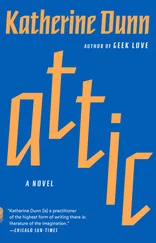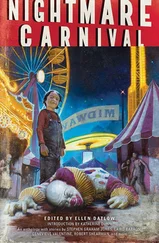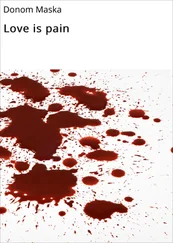Six of us could live comfortably in the thirty-eight-by-ten-foot van only by dint of religious housekeeping. The mess wore us down. We hated it. Obviously training had to begin immediately for this seventh member of the family.
With some well-placed hints from big brother Arturo, my ingenious father hit upon the expedient of glycerin and black tape for wiring Fortunato’s little buttocks to a miniature electric train transformer and a battery pack. Whenever Fortunato broke dishes or pulled hair or lifted Lil in the air and held her against the ceiling, Papa would gently turn on the power. In a matter of days, however, the precocious Chick, as we called him, learned to unplug the transformer and whip Papa’s curly pate with the cord.
Deprivation techniques were substituted, Clyde Beatty style, but Fortunato had to sleep in a heavy wire cage during that experiment because, when Lil refused to nurse him, he would simply yank her toward him and reenact his debut performance.
The raw potential of Fortunato’s abilities spurred my parents to research. By the time Chick was four months old. Al introduced the behavioral principles of B. F. Skinner and reinforcement theory successfully replaced deprivation.
Mama finally dared to bring him out of the Chick-proof bedroom. It was several weeks more before she could actually step out of the van with the baby in her arms and walk through the camp without his moving every bright-colored thing in sight.
7. Green — as in Arsenic, Tarnished Spoons, and Gas-Chamber Doors
The real trouble, as usual, was Arty. He’d always been jealous. He didn’t mind me so much because money was the gauge of his envy and I didn’t make any.
The twins, however, drove him wild. After every show he would hook his chin over the edge of his tank, spraying me with the overflow, to demand the number of tickets sold at the gate. “How many?” he’d holler. But it didn’t matter — thirty in Oak Grove, three hundred in Phoenix, a thousand in Kansas City. What he really wanted to know was how he had done compared to the twins. If they had as many or more in their audience he was furious.
Sometimes in those days he would flash to the bottom of the tank and sulk, holding his breath for incredible minutes, eyes bulging outside the sockets so they hid the lids entirely.
When I was five and first took over the duty of helping him after his shows, he terrified me with this tactic. He muttered, “I’ll die. I might as well,” and I wailed and hopped in agony as he sank, staring through the glass.
I ran shrieking to Papa. He clapped his cheek and bellowed at me not to humor Arty when he was “playing prima donna!”
I ran back dithering, chewing my hands in fright, until Arty finally allowed himself to roll slowly over and drift, belly up, toward the surface, where my short arms could reach him with the crook and tow him to the side. I patted and smoothed his water-swollen scalp and kissed his cheeks and nose and ears, weeping and begging him not to be dead because I, useless though I was, loved him. At last he blinked and sighed and let his breathing become visible and growled for his towel.
All this over a few tickets one way or another when he was ten years old. I knew he wouldn’t take to the Chick.
Nearly dawn. The show was closed down. Lil and Papa were asleep. The twins were snugged in their bunk snoring. Fortunato, the Chick, lay silent in his crib with the blanket twitching around him in his dreams. But at this end of the van twelve-year-old Arty sat propped against the table looking over the ticket-count sheets. I crouched on the floor with my back to the cupboard doors. If he was angry I would pop open one of the doors and creep inside bawling, shut myself into the blackness and pull my cap down over my eyes so I could cry into the wool, and pull Lil’s old sweaters over me. He shook his head. The yellow light gleamed on his skull and I began to sniffle a little. He threw a look at me — sharp — I gulped down my snot and grinned at him feebly. He turned back to the ticket sheets. His voice started slow and soft.
“Now, you know very well what I’m seeing here.” He wasn’t looking at me but I nodded, ready to cry. He was looking at the papers in a sad, doubtful way. His voice dripped regret. “Nobody expects you to bring in the kind of money that I do.” I shook my head. That would be absurd. “Or even,” he pursed his mouth, “what the twins manage.” I put my eyes down onto my knees and sighed, my whole worthless body quivering. “It isn’t your fault that you’re so ordinary. Papa accepts the responsibility for that.” The moment of silence told me that he was looking at me. I could feel his eyes on my hump.
As I cried he pointed out the discrepancies. When I did the talking for his show the tickets were 15 to 50 percent less than when Al did it. We both knew that Al only let me do it when we were in Podunk burnt-out towns for a quick stopover and that the sales were down all through the midway in those places. Still, there was some ghastly truth in Arty’s needling. Some probing of my guilt that was right no matter how he lied about it.
Then he would threaten me with the “institution,” which was the place that I would be sent to if I didn’t shape up. “No matter how generous and kind Papa and Lil are — they wouldn’t have any choice,” he would say. His sympathy and understanding washed around me with razors caught in the flow. Arty’s depiction of the “institution” scared me more than death or snakes. The institution was a cross between an orphanage and a slaughterhouse. Worst of all, it was run entirely by norms. The word alone would set my chin trembling. I would beg and grieve and he would allow that I deserved another chance.
“We don’t have to keep new kids,” Arty sneered. “Sometimes we don’t keep ’em and sometimes they don’t last.” He was in his mean lecturing mood, twisting his head to look at me over the back of his chair as I pushed him through the grey dawn to visit the dog act. “You don’t know about the ones before you,” he warned. “The ones that died. Papa and Mama don’t talk about them, but I remember.”
“I help Mama with the jars in the Chute.” I grunted, shoving hard to force the chair wheels through the sawdust. Arty snorted and shook his head. “There were three before me and two more before the twins. There was another one just before you. That’s why Papa let her keep you, because the other one died just before. It gets her down. You wouldn’t have been a keeper if the other one had lived. She gets low when she loses one and it bothers Papa to see her like that.”
He was trying to make me cry but I didn’t care. I was happy to have him talking to me. He’d been cranky and sullen for a long time. He went about his work, did his shows, ate, slept, read books, and didn’t talk much except when he was laying weasel trails for Mama and Papa.
“Which one was it? Just before me?”
Arty rolled his eyes and dropped his voice. “Leona.” He drew it out like a moan, watching me. I ducked my head and pushed his chair. Leona with the alligator tail would definitely have been a keeper. Leona would have had her own show tent and glow-in-the-dark posters in silver and green. Arty mused wistfully, “Papa was very excited about Leona. He thought about showing her in a tank. He was hoping she’d stay hairless but he could have depilated her if she’d started sprouting. He even thought about putting her in with me. Papa saw the billing as tadpoles. Different stages of tadpoles.”
He was light and airy about it. I stopped pushing and walked around to face him for a minute. He was nodding and blinking, pretending nostalgia for poor Leona.
Читать дальше












